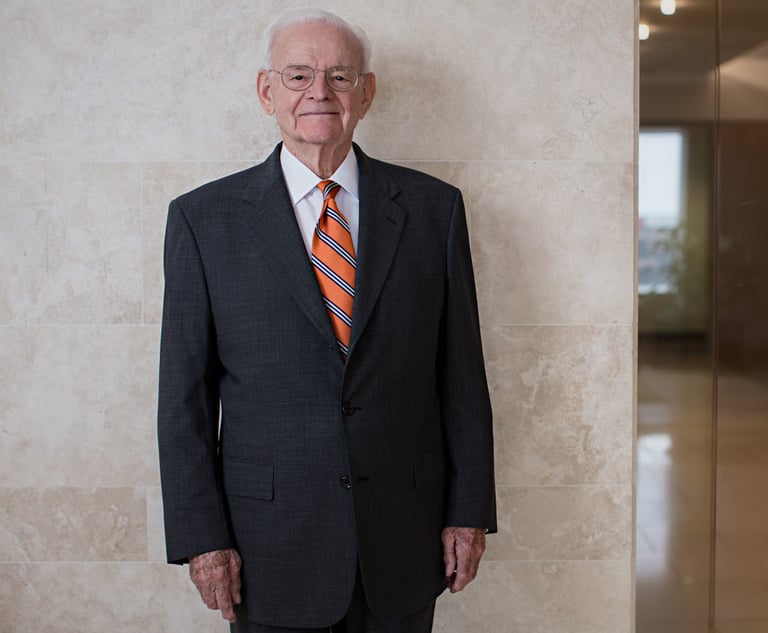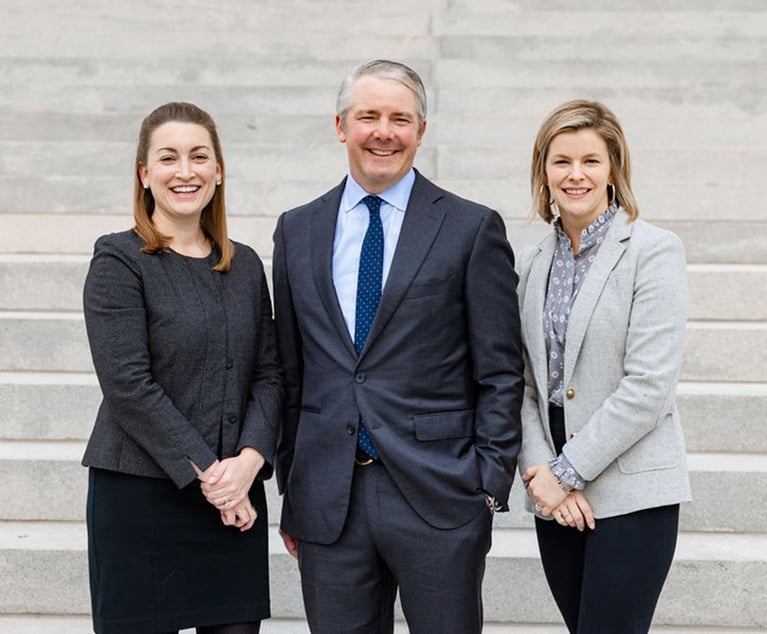Ethics Forum: Questions and Answers on Professional Responsibility
I was an attorney working at a Pennsylvania government agency. I have now left that agency and been hired as an attorney by another Pennsylvania government agency. Do I have to be screened because of the transfer?
April 30, 2020 at 01:29 PM
7 minute read
If a government lawyer goes to another government agency, there does not appear to be a screening process.
I was an attorney working at a Pennsylvania government agency. I have now left that agency and been hired as an attorney by another Pennsylvania government agency. Do I have to be screened because of the transfer?
 Samuel C. Stretton.
Samuel C. Stretton.
The requirements or rules for government attorney transfers are somewhat different than private transfers. When an attorney who, in a private practice transfer, takes another job where there may be conflicts, there is a very strong screening process set forth in Rules of Professional Conduct 1.10(b).
For government attorneys, when they leave a government practice, and go into private practice with a private firm, they are also required to do a screening process if they are disqualified from representing a person because of their prior government involvement. That screening process is set forth in Rules of Professional Conduct 1.11(b).
It is interesting to note that if a government lawyer goes to another government agency, there does not appear to be any screening process. Rule of Professional Conduct 1.11(d) discusses when a government attorney takes a new position with another government agency. Rule 1.11(d) references that the government lawyers are subject to the Conflict of Interest Rules 1.7 and 1.9, but also references that they shall not participate in the matter in which the lawyer participated personally and substantially for private practice or nongovernment employment unless the appropriate government agency gives informed consent. Comment 5 to Rule 1.11 elaborates on this. When looking at Rule 1.11(d), one notes there is no screening requirement as there is in 1.11(b) when a government lawyer goes into private practice. Comment 5 notes as follows: "When a lawyer has been employed by one government agency and then moves to a second government agency, it may be appropriate to treat that second agency as another client for the purposes of this rule, as one of the lawyers employed by a city, and subsequently employed by a federal agency. However, because the conflict of interest is governed by paragraph D, the latter agency is not required to screen the lawyer as Paragraph B requires a law firm to do. The question of whether two government agencies should be treated as the same, or different clients for conflict of interest purposes is beyond the scope of these rules."
Therefore, it seems that if one worked as an assistant district attorney, and then decided to change their job, and became hired by a local judge as their law clerk, the judge would not have to necessarily screen the law clerk on cases the law clerk had worked on as an assistant district attorney. That is because there is no screening required. On the other hand, Rule 1.11(b) states, a law clerk cannot participate personally or substantially on the case that he worked on previously.
Why there is no screening requirement is somewhat confusing. Perhaps someday the rule will have to be amended to require screening under both circumstances. This is particularly true since these judges have a higher standard in terms of conflict. For instance, the appearance of impropriety standard as a basis to disqualify a lawyer does not exist in the current Rules of Professional Conduct. It was taken out because many judges were using that to disqualify lawyers without doing the hard analysis to see what the actual conflict was. The Code of Judicial Conduct still maintains, as it should, the appearance of impropriety standard for potential removal of a judge. It is hard to fathom why there wouldn't be a screening process. Perhaps the judge could initiate one if those kinds of conflicts arise, but at least Rule 1.11(d) of the Rules of Professional Conduct does not appear to require it.
Sometimes, there seems to be inconsistencies in the Rules of Professional Conduct. There might well be a good reason, but the lack of screening could create problems.
|Unreported decision raises questions on getting PCRA trial certifications.
I am doing a post-conviction hearing relief petition (PCRA) on behalf of a criminal defendant. The prior criminal defense lawyer for the criminal defendant refused to cooperate and will not give me any statement as to what he did or did not do. I assume I just subpoena the prior lawyer for the hearing. Am I right?
You should be right. But there is a question raised by a recent nonprecedential case titled Commonwealth v. Devalle, (Pa. Superior Court. April 15). That case dismissed a PCRA petition alleging ineffective assistance of counsel for counsel's failure to obtain and present an expert witness to counter the commonwealth's expert. Further, trial counsel did not present any character witnesses.
The Superior Court, in the above memorandum of opinion, noted that the appellate counsel did not obtain a statement from trial counsel detailing counsel's reasoning for not presenting character witnesses at trial or provide an explanation for his failure to retain an expert witness.
This memorandum decision does raise some concerns. From a practical standpoint, any person who tries criminal appeals or PCRAs knows that it is very difficult, at times, to get the former trial counsel to sign anything admitting that they were ineffective or explaining what they were doing. In fact, many counsels will not respond and have to be placed on the witness stand during the PCRA hearing per a subpoena.
The above case raises some concern if all PCRAs are now going to be dismissed because the lawyer can't get a trial counsel certification. This places an unfair burden on the PCRA petitioner creates an impossible obstacle if their former trial counsel won't cooperate.
Therefore, as one goes forward keeping in mind this is an unreported decision, the best practice would be to, at least, have a certification from the PCRA counsel as to the times and efforts they made to contact trial counsel to get a statement, or certification as to their reasons or lack of reasons for doing whatever the alleged ineffectiveness is. It also would require a statement by the new PCRA counsel setting forth what trial counsel didn't do, and how that effected the outcome. That might well get over the concerns discussed by the court in Devalle. Any lawyer representing a client in a PCRA petition must be aware of the above decision and try to either follow it, or explain in a concrete, rational way why they could not get the trial lawyer's certification.
Many judges complain that they can't get lawyers to handle PCRA petitions on a court-appointed basis. Decisions like the above Superior Court decision are a classic example of why not. Court-appointed PCRA counsel normally has little monies for cases and get paid extremely low legal fees. The Superior Court's opinion acts as if they have unlimited resources and full and complete cooperation, which is just not the case. As this writer has often told lawyers, unless you have a lot of time and a lot of money, don't do court-appointed PCRAs because they are going to be your downfall, and many lawyers have had to face professional discipline because they could not do the PCRA properly.
Chester County lawyer Samuel C. Stretton has practiced in the area of legal and judicial ethics for more than 35 years. He welcomes questions and comments from readers. If you have a question, call Stretton directly at 610-696-4243 or write to him at 301 S. High St. P.O. Box 3231, West Chester, Pennsylvania, 19381.
This content has been archived. It is available through our partners, LexisNexis® and Bloomberg Law.
To view this content, please continue to their sites.
Not a Lexis Subscriber?
Subscribe Now
Not a Bloomberg Law Subscriber?
Subscribe Now
NOT FOR REPRINT
© 2025 ALM Global, LLC, All Rights Reserved. Request academic re-use from www.copyright.com. All other uses, submit a request to [email protected]. For more information visit Asset & Logo Licensing.
You Might Like
View All
'Taking the Best' of Both Firms, Ballard Spahr and Lane Powell Officially Merge
6 minute read
Judge Louis C. Bechtle: An American Jurist Who Relied on Common Sense, Sound Judgment and Fairness
5 minute read
Trending Stories
- 1Attorneys Allege Contract Broken For Sharing $13M In Fees From MDL
- 2ZwillGen Acquires Lawyers, Scientists and Technology from Luminos.Law, Developer of Luminos.AI Platform
- 3Clifford Chance Strengthens Private Credit Offering With Mayer Brown Partners
- 4MoFo Launches in Amsterdam
- 5The Importance of Contractual Language in Analyzing Post-Closing Earnout Disputes
Who Got The Work
Michael G. Bongiorno, Andrew Scott Dulberg and Elizabeth E. Driscoll from Wilmer Cutler Pickering Hale and Dorr have stepped in to represent Symbotic Inc., an A.I.-enabled technology platform that focuses on increasing supply chain efficiency, and other defendants in a pending shareholder derivative lawsuit. The case, filed Oct. 2 in Massachusetts District Court by the Brown Law Firm on behalf of Stephen Austen, accuses certain officers and directors of misleading investors in regard to Symbotic's potential for margin growth by failing to disclose that the company was not equipped to timely deploy its systems or manage expenses through project delays. The case, assigned to U.S. District Judge Nathaniel M. Gorton, is 1:24-cv-12522, Austen v. Cohen et al.
Who Got The Work
Edmund Polubinski and Marie Killmond of Davis Polk & Wardwell have entered appearances for data platform software development company MongoDB and other defendants in a pending shareholder derivative lawsuit. The action, filed Oct. 7 in New York Southern District Court by the Brown Law Firm, accuses the company's directors and/or officers of falsely expressing confidence in the company’s restructuring of its sales incentive plan and downplaying the severity of decreases in its upfront commitments. The case is 1:24-cv-07594, Roy v. Ittycheria et al.
Who Got The Work
Amy O. Bruchs and Kurt F. Ellison of Michael Best & Friedrich have entered appearances for Epic Systems Corp. in a pending employment discrimination lawsuit. The suit was filed Sept. 7 in Wisconsin Western District Court by Levine Eisberner LLC and Siri & Glimstad on behalf of a project manager who claims that he was wrongfully terminated after applying for a religious exemption to the defendant's COVID-19 vaccine mandate. The case, assigned to U.S. Magistrate Judge Anita Marie Boor, is 3:24-cv-00630, Secker, Nathan v. Epic Systems Corporation.
Who Got The Work
David X. Sullivan, Thomas J. Finn and Gregory A. Hall from McCarter & English have entered appearances for Sunrun Installation Services in a pending civil rights lawsuit. The complaint was filed Sept. 4 in Connecticut District Court by attorney Robert M. Berke on behalf of former employee George Edward Steins, who was arrested and charged with employing an unregistered home improvement salesperson. The complaint alleges that had Sunrun informed the Connecticut Department of Consumer Protection that the plaintiff's employment had ended in 2017 and that he no longer held Sunrun's home improvement contractor license, he would not have been hit with charges, which were dismissed in May 2024. The case, assigned to U.S. District Judge Jeffrey A. Meyer, is 3:24-cv-01423, Steins v. Sunrun, Inc. et al.
Who Got The Work
Greenberg Traurig shareholder Joshua L. Raskin has entered an appearance for boohoo.com UK Ltd. in a pending patent infringement lawsuit. The suit, filed Sept. 3 in Texas Eastern District Court by Rozier Hardt McDonough on behalf of Alto Dynamics, asserts five patents related to an online shopping platform. The case, assigned to U.S. District Judge Rodney Gilstrap, is 2:24-cv-00719, Alto Dynamics, LLC v. boohoo.com UK Limited.
Featured Firms
Law Offices of Gary Martin Hays & Associates, P.C.
(470) 294-1674
Law Offices of Mark E. Salomone
(857) 444-6468
Smith & Hassler
(713) 739-1250






